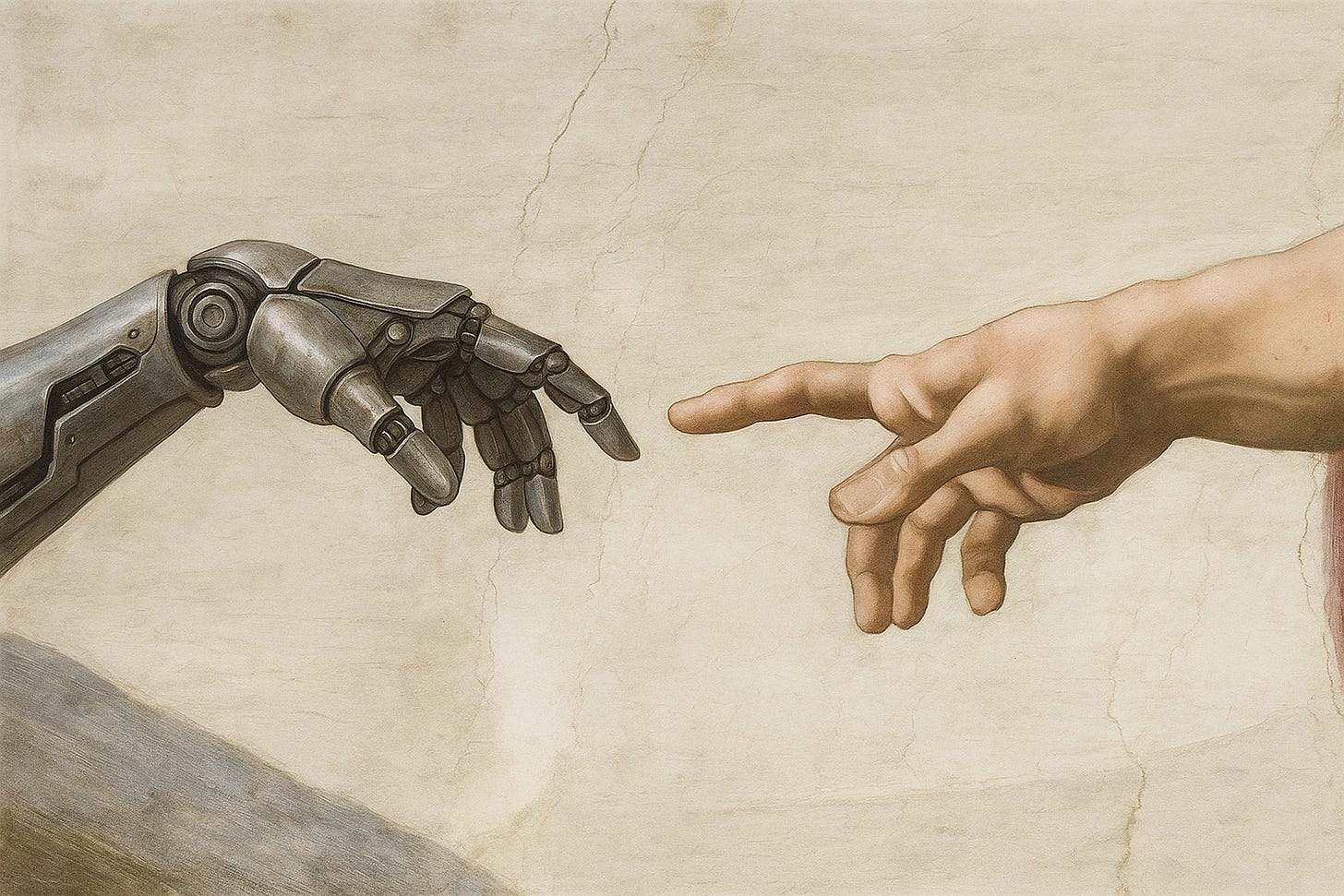The Holy Ghost in the Machine
Scientists have just created the first ever human-machine hybrid.
Scientists have unveiled the first commercially available computer that combines human brain cells with silicon circuitry. Dubbed a neuro-silicon hybrid, this machine doesn’t just simulate cognition, it uses real neurons, cultivated from human stem cells, to compute, learn, and even adapt in real time. This isn’t science fiction. It is already available for purchase.
But what, exactly, have we built?
And more importantly: What are we becoming?
The Flesh Inside the Machine
This new computer, developed by Australian company Cortical Labs, uses a biological core made of human neurons. These lab-grown brain cells are integrated into a computer system, creating a feedback loop between silicon and synapse. The result? A machine that can “learn” more efficiently than traditional AI models and in some cases, faster than the human brain itself.
Cortical Labs claims their invention could revolutionize machine learning, brain disease research, and energy-efficient computing. A full suite of press coverage hails this as a breakthrough in artificial intelligence, “organic computing,” as one article put it.
What Does It Mean to Be Human?
In the Christian tradition, the human person is not a disembodied mind, nor a biological machine. We are a union of body and soul, made in the image and likeness of God (imago Dei). That image is not reducible to computational capacity or neurological function. It is spiritual, relational, teleological.
So what happens when we embed the biological substrate of personhood into a non-human frame?
Some will say, “It’s just cells. There’s no soul.” Perhaps. But these are human cells, living cells, manipulated and wired into systems that perform tasks once seen as uniquely human: pattern recognition, decision-making, adaptation. If we believe in the sanctity of life and the irreducibility of the soul, we cannot dismiss the moral implications so easily.
Are we harvesting pieces of ourselves to create a counterfeit version of God’s handiwork?
The Temptation of Prometheus
This is not the first time mankind has dared to play god. In Prometheus, the titan steals fire from the heavens and gives it to man, who uses it to forge civilization and war. In Genesis, Adam and Eve eat from the Tree of Knowledge, grasping prematurely at divine prerogative. The result is exile and toil, wisdom tinged with sorrow.
Technology is not evil. But when it is untethered from virtue, it becomes a tool of hubris. As St. Augustine warns in City of God, the earthly city is marked by the love of self, even to the contempt of God.
In our quest to merge flesh with machine, what are we truly seeking?
More efficient data processing?
A deeper understanding of the brain?
Or is this a gnostic yearning to escape the limits of the body, the fallenness of nature, the mortality we refuse to accept?
This hybrid machine is not just a tool. It is a symbol of modernity’s longing to transcend itself, not by grace, rather “progress” by any means.
The Ghost in the Machine
Unlike traditional AI, which mimics human thinking through layers of silicon-based logic, this neuro-silicon computer literally thinks with flesh. It blurs categories we have long held sacred: life and mechanism, person and program, intelligence and instinct.
“The spirit gives life; the flesh counts for nothing.” — John 6:63
Jesus spoke these words to distinguish the true source of life from mere biology. The brain, miraculous though it is, is not the soul. But modern technocrats confuse the two. And in doing so, they court a dangerous inversion: elevating flesh to divinity, while denying the spiritual essence of man.
If we treat neurons as mere raw material for computation, how long before we treat humans as a whole the same…
Our data is already harvested for training AI globally, the new digital gold, how much further does it go?
Cortical Labs claim the neurons feel nothing as mere cells, but it is sensory neurons within us that transmit pain. What if we are wrong and we have creating a computer with feelings of pain?
What if we start to accept this treatment in the name of progress?
There are many questions around this new scientific frontier.
A Christian Response of Caution, Not Panic
Let us be clear: this technology may yield useful benefits such as understanding neurodegenerative diseases, reducing AI energy costs, even sparking new philosophical insights. But usefulness does not equate to goodness. And moral discernment must always precede innovation.
The Church has long wrestled with the tension between creation and corruption. We are called not to reject technology wholesale, but to subject it to moral scrutiny, to test the spirits, to paraphrase. (1 John 4:1).
This machine should not provoke fear, but vigilance.
We must ask:
Does it honor the dignity of human life?
Does it draw us closer to God, or away from Him?
Does it serve truth, or merely power?
If the answer is unclear, we must tread carefully.
Discernment in a Technological Age
We are not Luddites. But neither are we techno-utopians. We recognise there could be benefits to this creation, but the road to hell is paved with good intentions.
Aquinas wrote that reason, rightly ordered, is a path to God. But reason unmoored from revelation becomes a tower of Babel, a structure reaching heaven, built on pride. The neuro-silicon machine may be one such tower. Brilliant, yes. But also brittle and at risk of sheer hubris and abuse.
Flesh Alone Will Save Us
The neuron-laced computer is a marvel. But it is a dangerous leap forward.
Let us remain watchful. Let us remain wise. And let us never forget:
We were not made to become false machine Gods.
We were made to become like Christ.







